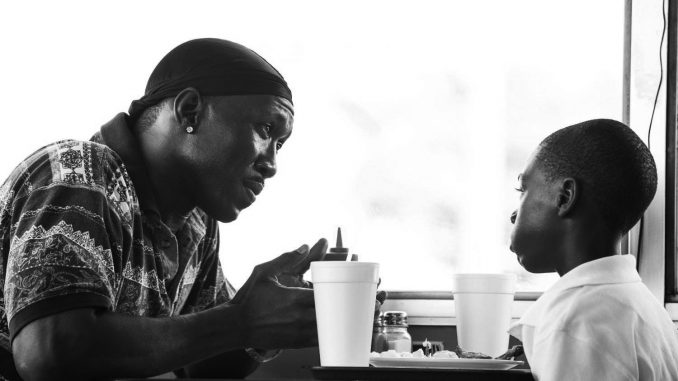
Alyssa VanPelt, Staff Writer
Moonlight is an award-winning, coming-of-age film released in 2016. It is written and directed by Barry Jenkins. Jenkins has also directed Mufasa: The Lion King and The Underground Railroad, which is a mini-series. Moonlight has won two hundred and thirty-five awards, including Best Motion Picture of the Year and Best Adapted Screenplay.
Although the film focuses on multiple aspects of identity such as race, poverty, addiction, and homosexuality, this article with primary focus on the queer aspects of the film and how Chiron grew from these experiences. Additionally, although there is a lack of deeper reading, this is a new formalist viewing, as the piece of art should do most of the explanation. The writers and directors have done a great job encapsulating the nuances of being queer within a minority community that struggles with drugs and poverty.
Moonlight is broken into three parts, or acts, following the main character as he goes from childhood to early adulthood. The first part begins with him as “Little,” his nickname as a kid. It is in this part that we learn that Little is being bullied, and he develops a father-son relationship with Paula’s drug dealer. Paula is Little’s mother. Juan, the father figure, has a conversation with Little about the term, “faggot.” Juan explains that it is a word to make people who identify as gay feel bad about themselves. That there is nothing wrong with being gay and that he should not allow others to make him feel bad. This scene is done in such a gentle way. Historically, it may have resulted in Juan avoiding the conversation altogether. However, by allowing Little to hear a man he admires handle the topic maturely and with love, it creates a healthier internalized identity for Little.
In the second part, Little now uses his name, Chiron. Chiron is still being bullied, but has support from his friend, Kevin. After Chiron hears about Kevin getting in trouble for having sex with a girl at school, Kevin has a dream about it. It is becoming more obvious to the audience that Chiron is queer through his sexual fascination with his friend Kevin. However, Kevin does reciprocate Chiron’s feelings as they do engage with each out sexually at the beach. Unfortunately, as this is reflective of the homophobia, Kevin participates in bullying Chiron the next day. This results in Chiron retaliating and going to prison. He did not retaliate towards Kevin despite Kevin being the one who attacked him directly. Chiron must have understood that Kevin was stuck within a system where being queer is wrong. So, to avoid being bullied, he had to bully Chiron. The previous internalized identity that Juan worked to support was being destroyed.
Chiron is now going by the name “Black” in the third part, as Kevin had given him that nickname before they became intimate. Black is a young adult selling drugs in Atlanta and has become notorious within his community. His mother, Paula, has finally begun her treatment and is staying at a drug rehabilitation center. However, Black receives a call from Kevin asking him to visit Miami. So, Black does. The two are awkward. Kevin cooks him food and tries to get Black to open up, but he doesn’t really. Then, when they are at Kevin’s place to continue catching up, Black admits he hasn’t been intimate with anyone since the beach. This is a reminder of the inner child within Black. Kevin hugs him, and it fades into a flashback of when he was a kid on the beach. Kevin has moved on and he is happy, but he isn’t satisfied with how Black turned out. In their final embrace, it is healing to his inner child. The film ends without a clear definition of the relationship between Kevin and Black. However, Black is gay, but he does not need to have the man of his dreams for there to be a happy ending. He just needed to heal his inner child and love himself.
Leave a Reply